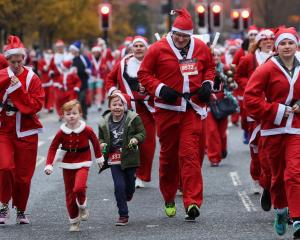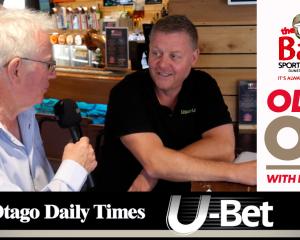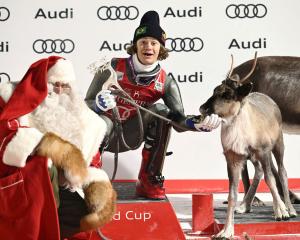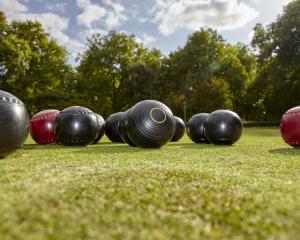His name is Scotty Stevenson, but you know him better as Sumo. He is the enthusiastic, effervescent face of Sky Television's rugby coverage. But who is he and where did he come from? Hayden Meikle finds out.
Scotty Stevenson: I can't complain, mate.
HM: Let's get straight into the tough, searching questions. Why are you called Sumo?
SS: Ha ha. I can't actually remember who gave me the name. But I remember TV3 had a show that always had sumo wrestling. I must have been about third form and I was into a bit of surf life-saving. I was the only chunky kid in speedos on the beach. I guess they thought the fat kid could be called Sumo. And I've had it ever since. For a long time, people didn't really know my real name. I remember once I made a rep rugby team and the selector had to come and ask me my real name. He'd walked up and down the sideline and asked who the No 5 was. Everyone said, ''Oh, that's Sumo'', and no-one knew my real name.
HM: So you played a bit of rugby?
SS: I actually played hockey for a while. We grew up in a place called Ruakaka. Up in the hill behind the town was a bloke called Ted Salmon, who'd played for New Zealand. A lot of the kids around the place got into hockey on the old grass fields in Whangarei. But hockey got a bit dangerous when you could hit the ball in the air and raise the stick over your shoulder, so I decided to look for a safer game. I wandered into the Waipu club and started playing rugby as a 12-year-old.
HM: What positions did you play?
SS: I started as a tighthead prop, worked my way back to lock, then to the blindside. Then realised I was too slow for that so I went back to lock. I was too short for a lock, too slow for a loosie and not strong enough for a front-rower.
HM: When did your playing career end?
SS: When I was 19. I dislocated both shoulders and had a few head knocks, so I figured I might give it a miss. The year I finished playing, I coached a team at Auckland Grammar School. I'm actually undefeated as a coach.
HM: Where did you go to school?
SS: I started up north, at a school called Bream Bay College. Then in the sixth form I was shipped off to boarding school at Auckland Grammar.
HM: A Grammar boy, goodness.
SS: Yeah, I consider myself a boy who went to Grammar, rather than a Grammar boy.
HM: What was the dream, growing up?
SS: My Dad was a fireman, and every little boy wants to do what his father does. But from about the age of 10, I started to think about getting into sports broadcasting and journalism. I spent four years on a three-year degree, and still didn't get the degree, but I got the job I wanted in the end.
HM: When did your broadcasting career really take off?
SS: Sky came along in 2007. I'd done various things after leaving AUT. I'd managed a few bars in Auckland, and had a stint writing for an ad agency, and then got into radio with the relaunch of Kiwi FM. In 2007, I got a call from Andrea McVeigh at Sky and she said there was an opportunity to report on what was then Friday Night Football. It was basically a live audition for the role. I turned up to a Chiefs game, they gave me a microphone, and the next day they gave me a job. I've just stuck around since then.
HM: When did you first call a game?
SS: In 2009. Wairarapa-Bush v Wellington in Masterton.
HM: I remember wondering who the hell you were, and how this complete stranger seemed to become the face of New Zealand rugby overnight. Was that how it felt to you?
SS: Ha ha, I don't know if I'm the face of anything. I just put my head down and got into it. I've been passionate about rugby for a long time. I've just been privileged to get into this position where I can meet players and coaches, and learn about the game on a weekly basis. I think I've worked pretty judiciously to get to where I am.
HM: Does it all come naturally or do you have to work hard at what you do?
SS: I think you're always learning. You don't arrive in any job and suddenly become top dog. You need to work hard. We spend a lot of time during the week preparing and planning and poring over numbers. I'm just part of a team. We have office staff and truckies and technical guys and camera guys and soundies and replay guys and directors and producers.
HM: How many games do you do a year?
SS: Probably about 50, either directly or indirectly. I'm on the road about 100 nights a year.
HM: Not every game of rugby is a classic. Do you ever get sick of it?
SS: Honestly, I have never walked away from a game that I haven't enjoyed. I can find highlights in an 8-6 win.
HM: I don't know whether to admire you or pity you.
SS: Maybe I'm a little tragic. But I think back to things like Ranfurly Shield games in Southland. They weren't high-scoring affairs but they were wonderful occasions. Or the Highlanders-Crusaders a few years ago. I sometimes think we're a bit spoiled by eight-try games. They're not all like that.
HM: There must be something about rugby at the top level that you would change.
SS: I've got a bee in my bonnet about one rule, and that's the intentional knockdown. I think an intercept is a legitimate defensive play. If your pass isn't good enough to beat the man, that's your fault. I think we over-analyse the laws a little bit.
HM: Do you take a lot of pre-game notes, or do you come up with stuff on the fly?
SS: You write a lot of notes but you might only use 5% of them. You'd just bore viewers to tears. The great thing about the job is there is an 80-minute story that unfolds, and you get to narrate it.
HM: Have you ever been completely lost for words?
SS: Hah, that's a good question. Occasionally you get bamboozled. But often we're just sitting there having a laugh. I work with some bloody lovely people. They're very generous with their time and their knowledge, and they're very funny. I remember an early game when it sank in that I was sitting next to Jeff Wilson, one of the great All Blacks, and I thought, ''Good grief, this is what I do for a living''.
HM: TV commentators are fair game. Have you picked up any specific criticism of your style?
SS: We're all human, and any criticism does sting you a little bit. We've all got hearts and souls and can take things personally. But if it's constructive, and there's justification for the criticism, you'd be a fool not to listen. If it's some anonymous guy on a social forum having a crack at you, what's the point in listening? I'm the same about praise. It's lovely to get but you've got to remember that it's just one person's opinion. You're not going to be universally liked and you need to deal with that.
HM: Best game you've covered?
SS: Oh, gee, that's tough. There have been a few. I love Ranfurly Shield games and I love the ITM Cup. Bay of Plenty v Hawkes Bay, two years ago, which ended 42-41 to Hawkes Bay with Ihaia West scoring a try in the 82nd minute. That was thrilling from start to finish. And that Southland-Otago Shield challenge in 2010. That game had everything, including Jamie Mackintosh's brother and the rest of the Satanic Verses standing under the commentary box and looking at me and singing, ''Who ate all the pies?''
HM: Favourite ground?
SS: Forsyth Barr Stadium.
HM: That's a very diplomatic answer.
SS: I'm not playing for the market here. What a facility. Ox and Coryn and those guys are great. When that stadium's full, I don't think there's an atmosphere like it in New Zealand rugby.
HM: If you could interview three players from throughout history to interview, who would you choose?
SS: Hmm. Well. That is a big question. That's very hard. I'd take Dave Gallaher. What an interview that would be. I always love a chat with Stephen Donald, so we'll throw him in. And for surprise factor, I'd go Andrew Hore.
HM: Hardest names to pronounce?
SS: You're talking to the guy who commentated Georgia v Romania in the Rugby World Cup. Pick one of them.
HM: You also do a bit of writing through Sky Sport Magazine and The New Zealand Herald. Did a full-time writing gig ever appeal?
SS: Absolutely. I love my writing and I try to write a feature every issue for the magazine. I was very lucky to be named sports feature writer of the year in 2012, which was unexpected. I would say to any budding broadcaster that telling a story is the most important thing.
HM: You wrote a very moving piece after the death of your father last year. Was he a big influence in your life and your love of rugby?
SS: Yeah, he played a bit of footy. He was originally a teacher in Bay of Plenty, and played rugby at a small club called Matata. He went to South Africa and taught in Durban and played a bit of footy there. He met my Mum there and she followed him back to New Zealand. Dad was a huge influence on my life and my brother's life. He was just a lovely man, very calm and patient, very driven and hard-working. He always supported us and he was intelligent and great to be around. I'm a father now and when I'm dealing with my kids, I often think about what he would do in a particular situation.
HM: How many kids have you got?
SS: Two boys. Ethan started school this year, and Joe is 3. Both hard cases.
HM: And you have a long-suffering wife?
SS: Hah, yes. She produces political current affairs, so she takes care of the politics and I take care of the sport. While I'm vaguely interested in politics, she's not remotely interested in rugby. But she's very supportive. Claire takes the lion's share of raising the boys when I'm away. She's great.
HM: How did a rugby commentator end up going to Russia for the Winter Olympics?
SS: Oh, it was a bit strange. The boss asked me if I skied and I said, ''No mate, I've got no balance, it's a miracle I can walk.'' He said they were sending me to Sochi. That was that. It was a very different experience for me but it was really enjoyable. Those kids from Wanaka were just great. All of the New Zealand athletes were spectacular. I know they copped some criticism for results but getting to meet them and watch them perform was good for the soul.
HM: And you're off to Glasgow for the Commonwealth Games?
SS: I am. I've put my hand up for lawn bowls. We're covering everything so it should be a busy few weeks.
HM: I better get your thoughts on the big test in Dunedin. What's going to happen?
SS: It's going to be interesting. England's made a lot of changes. I get the sneaking suspicion that Ben Smith, on his home patch and at fullback, will have a big game. I think we can hope to see a bit more cohesion from the All Blacks. This English team is full of good players. But I think the All Blacks will be more accurate, and if they play at their tempo, I'm confident they will win.












